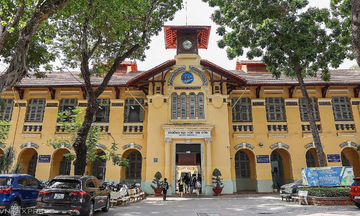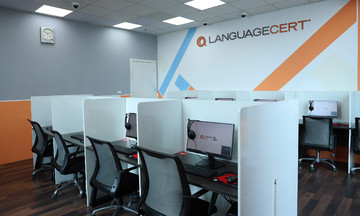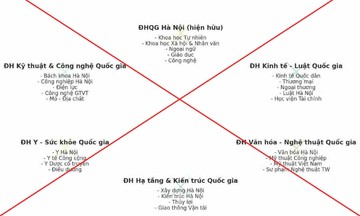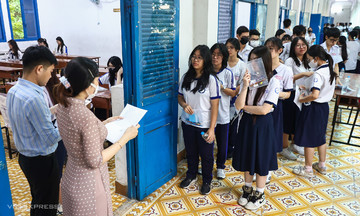Nguyen Thi Linh arrived in Hanoi from Quang Ninh at 4 a.m. on August 26th to enroll at the University of Social Sciences and Humanities, Vietnam National University, Hanoi. She and her mother braved heavy rain all afternoon searching for affordable accommodation, worried about rising prices and limited availability due to the late release of university admissions results.
Linh scoured Facebook groups for clean, well-ventilated rooms without mold, ideally costing around 3-4 million VND per month, suitable for sharing. However, most rooms near the university, in Thanh Xuan ward, were priced from 5 million VND upwards, excluding utilities, exceeding her budget.
Despite the heavy rain and flooding caused by the remnants of Typhoon Kajiki, Linh and her mother skipped lunch after completing enrollment procedures at 10 a.m. to continue their search.
"This weather is a good test to see if the rooms leak or if the area floods. If we don't act fast, we'll miss out," Linh explained.
 |
Linh and her mother wade through flooded streets in search of accommodation near the University of Social Sciences and Humanities on August 26th. Photo: Provided by the interviewee |
Linh and her mother wade through flooded streets in search of accommodation near the University of Social Sciences and Humanities on August 26th. Photo: Provided by the interviewee
Nguyen Lan Ngoc also arrived in Hanoi early on August 25th, after being accepted to Hanoi National University of Education. Though her enrollment date wasn't until September 3rd, she wanted to secure a room before prices increased. With the help of an acquaintance, Ngoc explored various options in Cau Giay district, known for its high student density, from mini apartments to traditional boarding houses, both in alleyways and near main roads. However, she found nothing suitable. Some rooms were too small, others had strict curfew rules, and some lacked parking for electric scooters.
According to Ngoc, a 10 square meter room, barely large enough for a bed and wardrobe, cost at least 4 million VND. Mini apartments near the university started at 5 million VND for single occupancy and 5.5 million VND for double occupancy, totaling around 6 million VND per month including utilities.
"Sharing a room would cost around 3 million VND each, but the small space is inconvenient. Cheaper rooms are often run-down and unsafe," Ngoc said, deciding to return home and continue her search later.
Dang Thanh Nga, from Bac Ninh, was equally anxious. Despite her enrollment date being September 15th, she squeezed in time between her night shifts at an industrial park to search for accommodation in Hanoi. Around Xuan La, Tay Ho district, she found options that were either poorly equipped, cramped, too far from the university, or located deep within alleyways.
With all universities announcing their admission results the previous week, many Hanoi institutions welcomed new students for direct enrollment, with a few starting in early September. This triggered a rush for accommodation among prospective students eager to settle in.
Dao Duy Tan, CEO of the room-finding app Rencity, reported a surge in demand, with approximately 300 students using the app daily and another 600 inquiries through other channels like Facebook, Zalo, and phone calls – a fivefold increase compared to normal periods.
"This is an annual trend during the enrollment period," Tan said. Unlike previous years where peak demand spanned August and September, this year's later admission announcements concentrated the search in late August.
Rentity currently partners with over 2,000 landlords, offering around 40,000 rooms, primarily in Tan Trieu - Trieu Khuc, My Dinh - Nam Tu Liem, and Kim Giang - Vu Tong Phan areas. Prices range from under 2.5 million VND to over 6 million VND per month, depending on size and amenities. Tan reported that 98% of rooms under 3.5 million VND and 93% of rooms above 3.5 million VND were already occupied.
"The occupancy rate is increasing rapidly," Tan added, noting a 5-8% average price increase compared to last year.
Thieu Thanh Tien, manager of T&H Land, a rental agency with over 100 rooms mainly in Nam and Bac Tu Liem districts, priced between 2.5-3 million VND per month, explained that rental prices vary by area. Compared to Cau Giay, accommodation in his area is generally more affordable and stable.
"90% of our rooms are already taken," Tien said.
Both Tan and Tien observed that freshmen often rely on social media groups to find accommodation. Unfamiliar with the city, they often seek assistance from acquaintances to inspect rooms before making deposits. Key criteria include proximity to the university, bus stops, markets, and basic furnishings.
The sudden surge in demand makes it challenging for many students to secure housing immediately. After an unsuccessful search, Ngoc opted to rent a three-bedroom apartment of approximately 100 square meters for 15 million VND. She plans to occupy one room and find 2-3 roommates for the others.
"The cost is similar, but renting an entire apartment offers more comfort, cleanliness, and security," Ngoc explained. The apartment is 2 km from her university, so she intends to use the bus initially and later bring her motorbike from her hometown.
After two days of searching, Nga found a 25 square meter mini apartment for 4.8 million VND per month.
"The room is equipped with a washing machine, air conditioning, refrigerator, water heater, wardrobe, study desk, induction cooker, and sink, and it's only 1 km from the university. I've paid a one-month deposit," Nga said, explaining her decision to secure the room early despite losing a month's rent. She believes finding a suitable, affordable room in September, when the influx of students arrives, will be much harder.
Vietnam has nearly 2.1 million students, mostly concentrated in Hanoi and Ho Chi Minh City. Around 600,000 new university students enter the system annually. However, existing dormitory capacity in these major cities falls far short of meeting the demand.
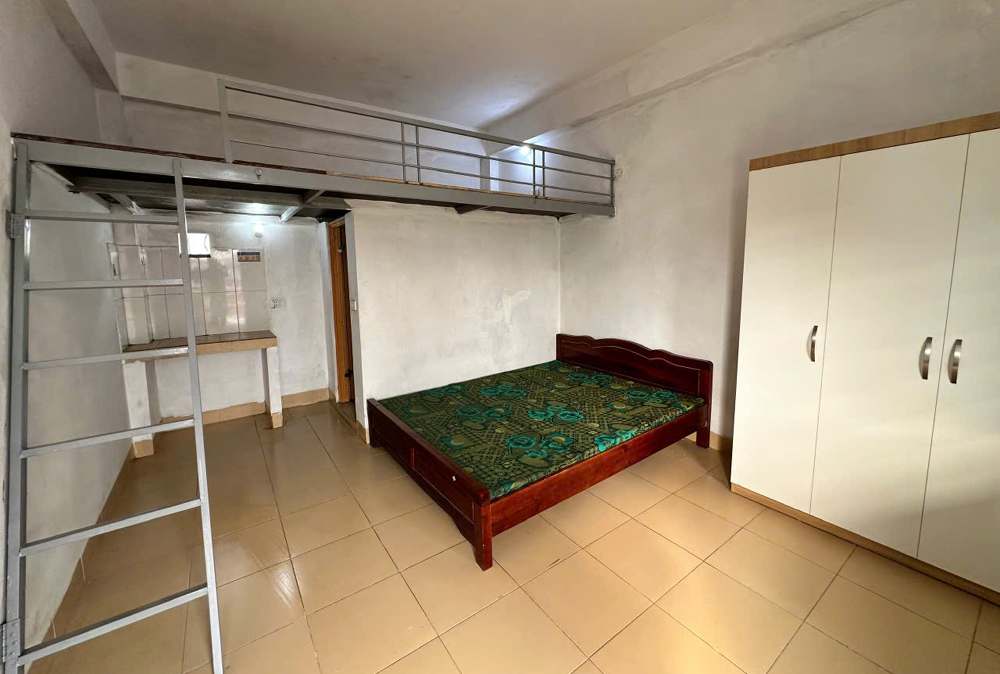 |
A furnished room with a bed, wardrobe, and water heater rents for 2.5-3 million VND per month. Photo: Thieu Thanh Tien |
A furnished room with a bed, wardrobe, and water heater rents for 2.5-3 million VND per month. Photo: Thieu Thanh Tien
Dr. Vu Van Hai, Deputy Head of the Training and Student Affairs Department at the University of Languages and International Studies, Vietnam National University, Hanoi, acknowledged the high demand for student accommodation, emphasizing that university dormitories can only accommodate a small percentage of students. His university offers around 300-400 dormitory places, with the remaining students relying on private rentals. Students are required to update their residential addresses one month after enrollment to facilitate local authority collaboration with the university.
To avoid scams, Dr. Hai advises students to seek landlords with transparent information and ensure the accommodation meets fire safety standards.
"When viewing rooms and signing contracts, students should carefully review all terms and conditions, including deposits, utility charges, to avoid future issues," he said.
Linh and her mother finally secured a room a 10-minute walk, about 500 m, from the university. The five-story building has one room per floor. The area is conveniently located, with plenty of food stalls and minimal flooding.
The landlord agreed to let Linh share the room with two other students for 4 million VND per month, with a one-year deposit. Linh, having found roommates, estimates her monthly expenses, including utilities and Wi-Fi, at around 2 million VND. With the contract signed, Linh and her mother returned home relieved.
"It was tiring, but at least I don't have to worry about where I'll be living," Linh shared.
Binh Minh






